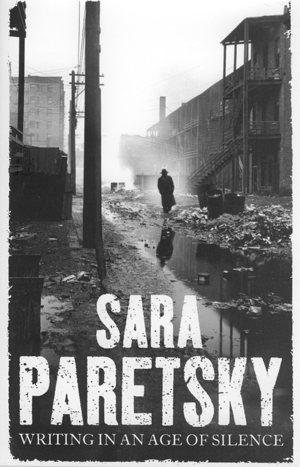Inspiring Older Readers
 posted on 15 Aug 2017
posted on 15 Aug 2017
Writing In An Age of Silence by Sara Paretsky
Like me, you might have thought that US politics had pretty much scraped the bottom of the barrel when it elected George W. Bush. After all, how much more stupid and incompetent could a ‘world leader’ get? Well, we now live in the age of Trump and we all have to hold up our hands and say we were wrong, there clearly is no bottom to this particular pit.
Published in 2007 as a response to the attacks on civil liberties that the Bush administration unleashed in his ‘war against terror’, Sara Paretsky’s polemical memoire seems even more relevant now we are sitting on a global powder-keg with a former reality celebrity lighting matches.
Paretsky is most widely known for the creation of the complex female detective, V.I. Warshawski but she’s a lot more than simply a thriller writer. Her background includes a degree in political science from the University of Kansas and time spent in community work in south-side Chicago, so she has a continuing significant interest in the role of the writer as a political commentator.
In truth this book is a series of extended essays that have been sewn together and cover a whole range of issues from how Paretsky became a writer, what led to the creation of Warshawski, her influences, her reading and through to the impact of the Patriot Act on an artist.
Paretsky grew up in a very difficult circumstances in Kansas; not only did her Jewish background mark the family out, the rigid patriarchy of the time dominated everything:
I grew up in a world where white, Republican, Protestant male decision-makers…were so much the norm that any questioning of this standard produced an aggressive reaction. Nowhere in the country, not even in Berkley or Madison, was the reaction to the women’s movement, the Civil rights movement, or the anti-war movement as violent as it was in my home town.
But Paretsky belonged to a new age of political activists not prepared to let the status quo have an easy ride and by the middle to late 1960s she was aware that things were changing:
It was my great good fortune to come of age just when America became a land of great possibility and opportunity. For the next decade, I rode the waves of a wonderful revolution.
In 1966 Paretsky went to Chicago to get involved in community work and her experiences on the South-Side was a key factor in the creation of her female detective, V.I. Warshawski:
Much of what shaped V.I.’s history came out of the summer, including my trying to understand not just the city’s racial divisions, but its ethnic and religious ones.
Reflecting on her upbringing Peretsky realised that growing up female she had been made voiceless :
I was a person raised to serve, who came of age in a time of passion for justice. My character dovetailed neatly with the times. My own sense of voicelessness also led me to see the anguish of the powerless.
It was writing that would give her back her voice – and knowing this means that she thinks it is important not just to understand how that voice can be made effective but also how it can be defended. It’s critical that writers continue to engage and speak out in the political world because otherwise politicians will rob them of that privilege.
I can’t stand idly by while my beloved country reduces its citizens to speaking in whispers out of fear of what their invisible, invasive government may do.
This is a writer's manifesto, an angry, committed piece of work that deserves a wider audience than it has had. I didn’t see anything much about the book when it was published and if I hadn’t stumbled over it recently in a charity bookshop I wouldn’t have known it existed – and that’s such a shame. Peretsky is a fine writer and this is a lean, well-argued piece of essay writing of a kind that seems to be slightly out of fashion at the moment but I think we need more of these incursions into the political agenda from writers who have built an audience and who have something consequential to say.
Terry Potter
August 2017